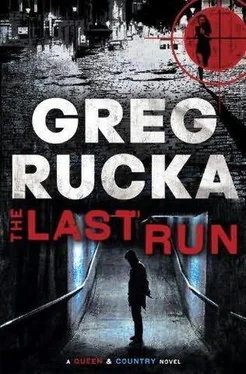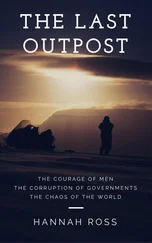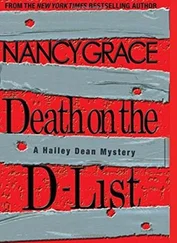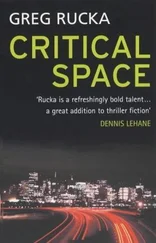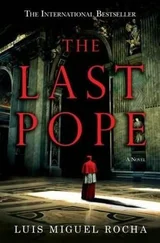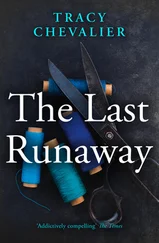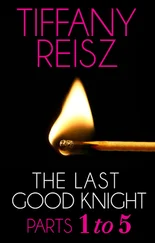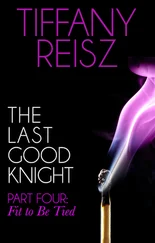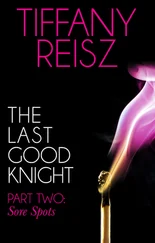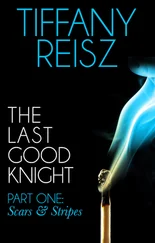Greg Rucka - The last run
Здесь есть возможность читать онлайн «Greg Rucka - The last run» весь текст электронной книги совершенно бесплатно (целиком полную версию без сокращений). В некоторых случаях можно слушать аудио, скачать через торрент в формате fb2 и присутствует краткое содержание. Жанр: Шпионский детектив, на английском языке. Описание произведения, (предисловие) а так же отзывы посетителей доступны на портале библиотеки ЛибКат.
- Название:The last run
- Автор:
- Жанр:
- Год:неизвестен
- ISBN:нет данных
- Рейтинг книги:4 / 5. Голосов: 1
-
Избранное:Добавить в избранное
- Отзывы:
-
Ваша оценка:
- 80
- 1
- 2
- 3
- 4
- 5
The last run: краткое содержание, описание и аннотация
Предлагаем к чтению аннотацию, описание, краткое содержание или предисловие (зависит от того, что написал сам автор книги «The last run»). Если вы не нашли необходимую информацию о книге — напишите в комментариях, мы постараемся отыскать её.
The last run — читать онлайн бесплатно полную книгу (весь текст) целиком
Ниже представлен текст книги, разбитый по страницам. Система сохранения места последней прочитанной страницы, позволяет с удобством читать онлайн бесплатно книгу «The last run», без необходимости каждый раз заново искать на чём Вы остановились. Поставьте закладку, и сможете в любой момент перейти на страницу, на которой закончили чтение.
Интервал:
Закладка:
He sipped at his coffee, tasting the thick grounds as he reached the bottom of the cup. Barnett had suggested static surveillance, but now that he was here, Caleb simply couldn't see a way that was going to work, certainly not at night, certainly not with the police and the rain. Mobile surveillance wouldn't do, either; there was no way he could envision to both stay in motion and keep eyes on the whole block. It just wasn't possible. The only thing that Caleb could think to do, in fact, was to start working through the apartments one by one, knocking on each door in turn, and asking if, perhaps, anyone knew where he might find someone code-named Falcon.
The absurdity of the idea made him smile.
There was no way he could find Falcon, he concluded, certainly not without exposing the both of them.
Which meant that Falcon was going to have to find him. There was no message from Barnett the next morning, but when Caleb stopped by the embassy before heading back to Karaj, he noted that at least two of the Security detail he was used to seeing on-site were nowhere to be found, and he concluded that Barnett must have already secured the safehouse. As part of the SIS position within the FCO, the Firm trained and provided guards for each embassy, with additional security provided by subcontracting through local agencies. The irony of hiring Iranians to guard the British Embassy in Tehran wasn't lost on anyone on either side, and it was accepted as a given that any local thus employed was delivering daily reports to someone in the Republican Guards or VEVAK or both about all they had seen during their shift. High-security areas were, of course, restricted to U.K. personnel only, and all operations were overseen by SIS Security.
It was three minutes to nine when he reached Karaj, the Nikon slung over his shoulder and a guidebook in his hand. This time Caleb approached Nilufar from the south, starting at Sepah Square. The square really wasn't, instead a large, finely tended grass roundabout where Aras Avenue converged with the multilane east-west highway that ran all the way back to Tehran. At the center of the roundabout stood a monument to the Sepah, four fine-featured soldiers facing in every cardinal direction, holding flags or rifles, all of them leaping skyward, as if ascending to heaven.
Caleb stopped and took several pictures of the monument, mostly to get the feel for the camera. He was careful to only shoot facing north; southeast of where he stood, fenced, patrolled, and guarded, was the Basij-e Sepah base. It took four and a half minutes before the traffic cleared enough that he could sprint across the road, north, to the next median, and from there it was only a short walk and a relatively shorter delay before he was able to cross west onto Nilufar.
There was a slight rise here to the road, another grass-covered slope dotted with trees, with a small gazebo set upon it. Caleb took a seat on one of the benches inside, checked the camera, and now looking down Nilufar to the west, took several shots in succession of the street. Shops were opening, first customers beginning to trickle into the coffeehouse he had visited the night before, as well as to the bank just south of where he was now sitting.
He watched the street for the next several minutes, pretending to alternately check his guidebook and his camera. The night before, he had arrived believing he would have to watch the apartment buildings, but today he gave them only a cursory glance. If Falcon was flying a flag from one of the windows, Caleb couldn't see it, and he was now increasingly certain that was because it wasn't there. Each apartment had an identity, a corresponding tenant or owner, and anything that drew attention to the location would logically draw attention to its occupant. Better to set the flag someplace more anonymous, somewhere Falcon could be just one of many, in one of the restaurants or shops along the street.
So Caleb watched the street-the bank and the restaurants and the coffeehouse-and while he did that he tried to keep an eye out for the police, and he tried to determine if he, himself, was under surveillance, and when it all became too much he rose and walked down Nilufar to buy himself another cup of ghahveh. He drank it at a table, was rising to leave when he looked back and saw, seated alone near the back of the room, a man in his late middle-age, graying hair and a neatly trimmed beard, sitting by himself, a book closed on the table in front of him. Caleb couldn't make out the Farsi from the distance, but he could see the illustration, the different birds taking flight on the cover, and the aftertaste of the too-sweet coffee turned sour in his mouth.
If there was a falcon in the flock on the cover, he couldn't see it.
He took his empty cup back to the counter, using the opportunity to take another survey of the room. The man had been seated when Caleb had entered, he was sure of it, and he was just as sure that the book hadn't been out at that time.
"Agha," Caleb said. "Salam aleykum."
The man smiled up at him. "Salam aleykum. Your Farsi is very good for a tourist."
"Thank you. You're interested in birds?"
"Yes, all sorts." The man picked up the book, turning it in his hand. "Though we don't see many here during the winter."
"I'd think you'd see some around here."
"A few. I don't get out often to look. You like birds?"
"Some more than others. I'm partial to birds of prey. Falcons, hawks, birds like that."
"Those are all good birds. There are, of course, many others." The man seemed to consider, looking at the book in his hand, then offered it to Caleb. "I've read it several times. Perhaps you'll have more use for it than I."
"That's very generous of you," Caleb said, taking the book in hand. He freed the camera from his shoulder, turning to a nearby waiter. "Excuse me, could you take a picture for me? Of me and my friend here?"
"My pleasure."
"Just point and shoot. It's okay if you take a couple of them." Caleb moved beside the man, still seated at the table, held up the book with a grin. The waiter pointed the camera, and he heard the shutter click repeatedly before it was handed back. "Thank you."
The waiter moved off, smiling, perhaps amused, and Caleb turned again to the man at the table, who was now looking at him much more soberly.
"I hope you enjoy the book," the man said. "You should read it soon."
CHAPTER EIGHT
Paul Crocker sat on the edge of his desk, eating his dinner of takeaway salad from the commissary, and contemplated who he would most like to stab first with his plastic fork. On any given day, he would readily admit, the list would be a long one, populated by anyone from the file runner who didn't seem to understand that now meant now-god-dammit and not now-but-after-you've-had-a-nice-chat-with-my-PA, to the Head of Station in, say, Sucre, who couldn't mount an operation on his own without a coloring book and large-type instructions relayed in triplicate and signed by everyone from the PUS at the FCO to C to the Head of the Janitorial Staff.
And that was the list without the addition of politicians.
"I know that look," Julian Seale said. "Just tell me it's not me you're planning to murder."
Crocker shook his head, forcing down a particularly limp piece of cucumber. "You can relax. You're so low on the list they'll have caught and killed me long before I reach you."
Seale leaned forward in his seat, swiping a broad palm across his thigh to clear it of crumbs from his sandwich, before taking hold of the edge of the map laid out on Crocker's desk. He was a tall man, like Crocker, but broader, the body of an American footballer, as opposed to a British one. One of the few African Americans holding senior posts with the CIA, he'd held the Chief of Station office at the embassy in Grosvenor Square for just under five years now, an exceptionally long time for such a tour, and one that was due to end at the turning of the year. If Operation: Coldwitch resolved as everyone from Downing Street to the White House hoped it would, Seale would be leaving London on a high note, indeed.
Читать дальшеИнтервал:
Закладка:
Похожие книги на «The last run»
Представляем Вашему вниманию похожие книги на «The last run» списком для выбора. Мы отобрали схожую по названию и смыслу литературу в надежде предоставить читателям больше вариантов отыскать новые, интересные, ещё непрочитанные произведения.
Обсуждение, отзывы о книге «The last run» и просто собственные мнения читателей. Оставьте ваши комментарии, напишите, что Вы думаете о произведении, его смысле или главных героях. Укажите что конкретно понравилось, а что нет, и почему Вы так считаете.
